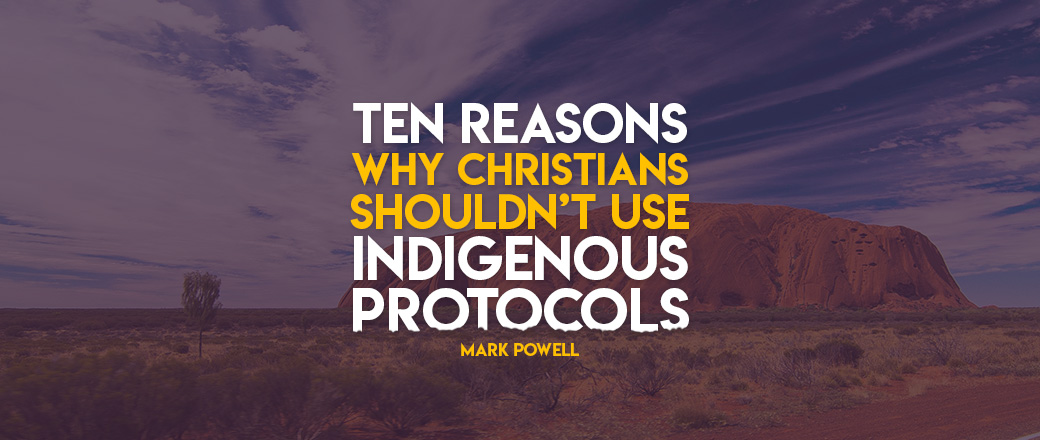Both Welcome to Country—said by an indigenous person—and Acknowledgement of Country—which is said by someone who is not indigenous—have become a popular practice in the media, government and even in business. What’s more, Aboriginal smoking ceremonies to ward off evil spirits have become an integral part of the opening of the Australian parliament for the past decade.
Significantly, a range of these ‘indigenous protocols’ is also being increasingly conducted at the opening of church services, ecclesiastical synods, graduation ceremonies, school assemblies, etc. But while the motivation behind it is well-intentioned, I believe that the rationale for doing so is fundamentally flawed.
What follows are ten reasons why I believe Christians should abstain from such practices:
First, it takes away from the worship of God. The Bible declares that “The earth is the LORD’s and everything in it” (Ps. 24:1) and that He says “I will not give my glory to another or my praise to idols” (Isa. 42:8). Hence, the practice of things such as “smoking ceremonies” to ward off evil spirits is completely at odds with Christian theology.
Second, it leads to syncretism. Following on from this, because Aboriginal cosmology is pantheistic—God and the creation are one—there is a tendency for the traditional religious beliefs to be fused together with Biblical truth. Once again, this is incompatible with the exclusive claims of Scripture which teaches that faith in Jesus Christ is the only way to be saved (Acts 4:12; John 14:6).In contrast, note the recent article in Eternity the by Aboriginal Christian, Brooke Prentis, where she refers to Uluru as the “most sacred and holy place” which gives to a part of God’s creation an idolatrous status and spiritual significance (i.e., Rom 1:18-25).
Third, the parallel to ancestor worship. Official indigenous protocols insist that words like ‘Elder’ should be capitalised to acknowledge the continuing real presence of those who have died. (This is also why there is a warning on television programs which show images of deceased aboriginal people). However, acknowledging aboriginal ‘Elders’ past, past and emerging is not simply honouring the memory of the departed—like many Australians do on ANZAC Day—but is more akin to the ancestor worship still practised by many people today.
Fourth, Biblical peacemaking principles of forgiveness teach that past sins should not be continually re-raised once they have been repented of. However, these prescribed ‘politically-correct’ statements do precisely that. They have the practical effect of perpetuating guilt while allowing no final resolution or real reconciliation to occur.
Fifth, the political nature of language. The secular form of language used in Indigenous protocols (such as ‘Traditional Custodians’, and ‘Respect to Elders’) is neither politically nor theologically neutral. As such, if we are serious about reconciliation then we ought to use biblical language to express theological truths of sin, repentance, forgiveness and reconciliation.
Sixth, it implies guilt by association. There is a growing pressure in our country to conform to a progressive social agenda involving identity politics. As such, to what extent are Christian denominations—or their individual members—responsible for historic crimes committed during the colonial period of Australia? Whereas injustices have tragically occurred, we should be careful of condemning our own spiritual forebears or of implicating the church today through guilt by association.
Seventh, ‘theft’ must involve full financial reparation. While many regularly acknowledge their guilt of dispossessing aboriginals of their land, very few are willing to make financial restitution. But if one truly believes that they are in possession of ‘stolen property’ then they should give it back and not, simply engage in disingenuous displays of virtue signalling. What’s more, this should be done by the individuals most concerned and not merely projected onto their own particular religious institution.
Eighth, it undermines Gospel reconciliation. As the Gospel goes out to the ends of the earth, the redemptive power of the cross will continue to deliver God’s chosen people from enslaving idolatries and unite us together in Christ. But Welcome to Country and Acknowledgement of Country protocols support a worldview that privileges aboriginal culture within our society and thereby hinders—rather than promotes—the work of reconciliation.
Ninth, it harms Christian unity. Our doctrine of the unity of the body of Christ is harmed since it perpetuates an unnecessary distinction between Aboriginal and all other Christians who live in Australia. In short, it rebuilds the dividing wall which previously existed before the cross (Eph. 2:14-18; Gal. 3:28).
Tenth, because the current Aborigines were probably not the original inhabitants. This is a position historically held by many Australian anthropologists, scientists, and academics. For example, Professor Manning Clark (1915-1991), originally argued that the modern Aboriginal was a descendant of a racially distinct, third wave of immigrants, who had themselves invaded and conquered those living here before them.
In conclusion, it is important to remember that the arrival of Europeans brought the light of the Gospel to those in darkness and that it was in fulfilment of the sovereign plan of Almighty God (Acts 17:26-27). And while traditional aboriginal smoking ceremonies were powerless to ward off evil spirits, the Lord Jesus Christ has bound the strongman once and fall all (Matt. 12:29; Col. 1:13).





















